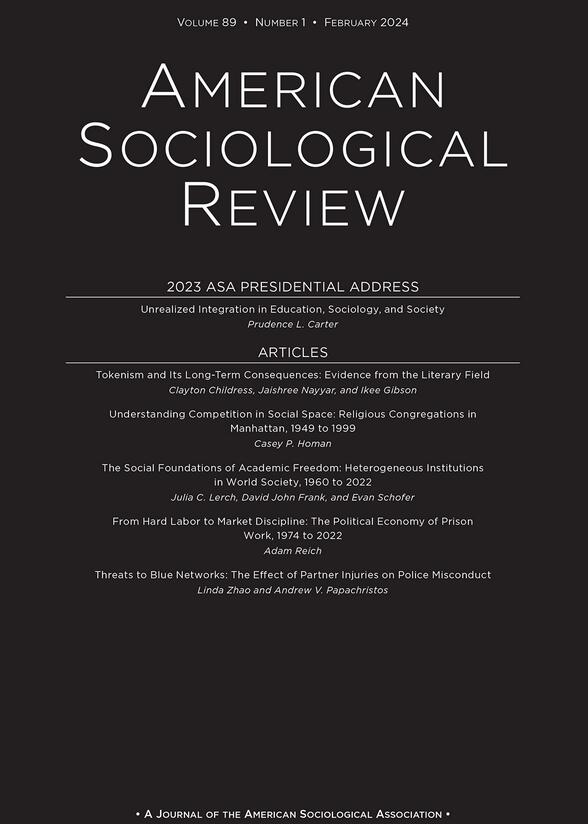兄弟姐妹对认知和社会行为发展的影响:持续的争论和新的理论见解
IF 6.2
1区 社会学
Q1 SOCIOLOGY
引用次数: 0
摘要
尽管社会科学家长期以来一直关注兄弟姐妹的影响,但以往的研究并没有解决兄弟姐妹数量与儿童发展的相关性以及与更多兄弟姐妹一起成长是否有益的争论。本研究利用 30 年的纵向数据和固定效应模型,就兄弟姐妹人数与认知和社会行为发展的关系提供了最全面的证据。我们还系统地比较了不同顺序位置的儿童获得兄弟姐妹的后果,从而推动了文献的发展。与之前使用有限观察期的选择性数据进行的研究相反,我们发现随着家庭规模的扩大,儿童的认知测试成绩会出现净下降。同时,我们的分析表明,兄弟姐妹的增加只对头胎和二胎儿童的认知发展有重要影响,而对后胎儿童的认知发展没有影响。即使对第一胎和第二胎的孩子来说,每增加一个兄弟姐妹,其边际效应也会减弱。因此,我们的研究结果证明了家庭资源稀释过程的时间依赖性。在社会行为发展方面,有证据表明,有一个年长的兄弟姐妹是有益的,但对于某些孩子(如头胎孩子)来说,增加一个年幼的兄弟姐妹会增加他们的行为问题。由于大家庭中更多的孩子有哥哥姐姐,因此大家庭中的孩子平均表现出的问题行为较少。通过揭示兄弟姐妹与非认知发展之间的复杂关系,本研究也为家庭社会学和不平等做出了总体贡献。本文章由计算机程序翻译,如有差异,请以英文原文为准。
Effects of Siblings on Cognitive and Sociobehavioral Development: Ongoing Debates and New Theoretical Insights
Despite social scientists’ long-standing interest in the influences of siblings, previous research has not settled the debates on how relevant sibship size is to child development and whether growing up with more siblings could be beneficial. Using 30 years of longitudinal data and fixed-effects models, this study offers the most comprehensive evidence on how sibship size is tied to cognitive and sociobehavioral development. We also advance the literature by systematically comparing the consequences of gaining a sibling for children with varying ordinal positions. Contrary to prior studies using selective data from limited observation spans, we find that children experience net decreases in cognitive test scores as their family size grows. At the same time, our analysis shows that sibling additions are only important to first- and second-born children’s—not later-born children’s—cognitive development. Even for the first- and second-born, the marginal effect of adding a sibling lessens with each addition. Our results thus demonstrate the time-dependent nature of family resource-dilution processes. For sociobehavioral development, the evidence indicates that having an older sibling is beneficial, but gaining a younger sibling increases behavioral problems for some (e.g., first-born children). Because more children from large families have older siblings, children from larger families exhibit less problematic behavior, on average. By uncovering the complex relationship between siblings and noncognitive development, this study also generally contributes to the sociology of family and inequality.
求助全文
通过发布文献求助,成功后即可免费获取论文全文。
去求助
来源期刊

American Sociological Review
SOCIOLOGY-
CiteScore
13.30
自引率
3.30%
发文量
35
期刊介绍:
The American Sociological Association (ASA) is a non-profit membership association established in 1905. Its mission is to advance sociology as a scientific discipline and profession that serves the public good. ASA is comprised of approximately 12,000 members including faculty members, researchers, practitioners, and students in the field of sociology. Roughly 20% of the members work in government, business, or non-profit organizations.
One of ASA's primary endeavors is the publication and dissemination of important sociological research. To this end, they founded the American Sociological Review (ASR) in 1936. ASR is the flagship journal of the association and publishes original works that are of general interest and contribute to the advancement of sociology. The journal seeks to publish new theoretical developments, research results that enhance our understanding of fundamental social processes, and significant methodological innovations. ASR welcomes submissions from all areas of sociology, placing an emphasis on exceptional quality.
Aside from ASR, ASA also publishes 14 professional journals and magazines. Additionally, they organize an annual meeting that attracts over 6,000 participants. ASA's membership consists of scholars, professionals, and students dedicated to the study and application of sociology in various domains of society.
 求助内容:
求助内容: 应助结果提醒方式:
应助结果提醒方式:


